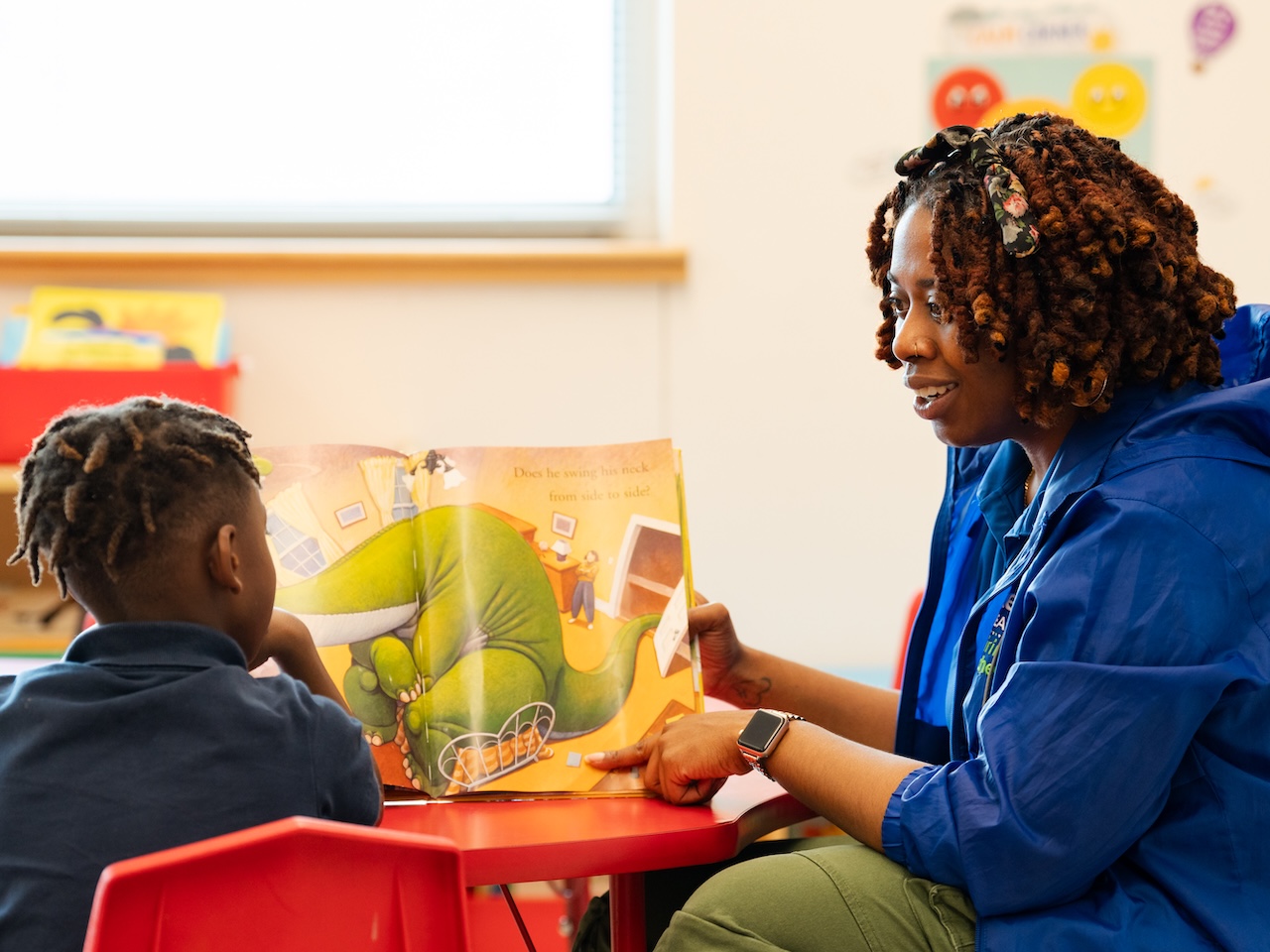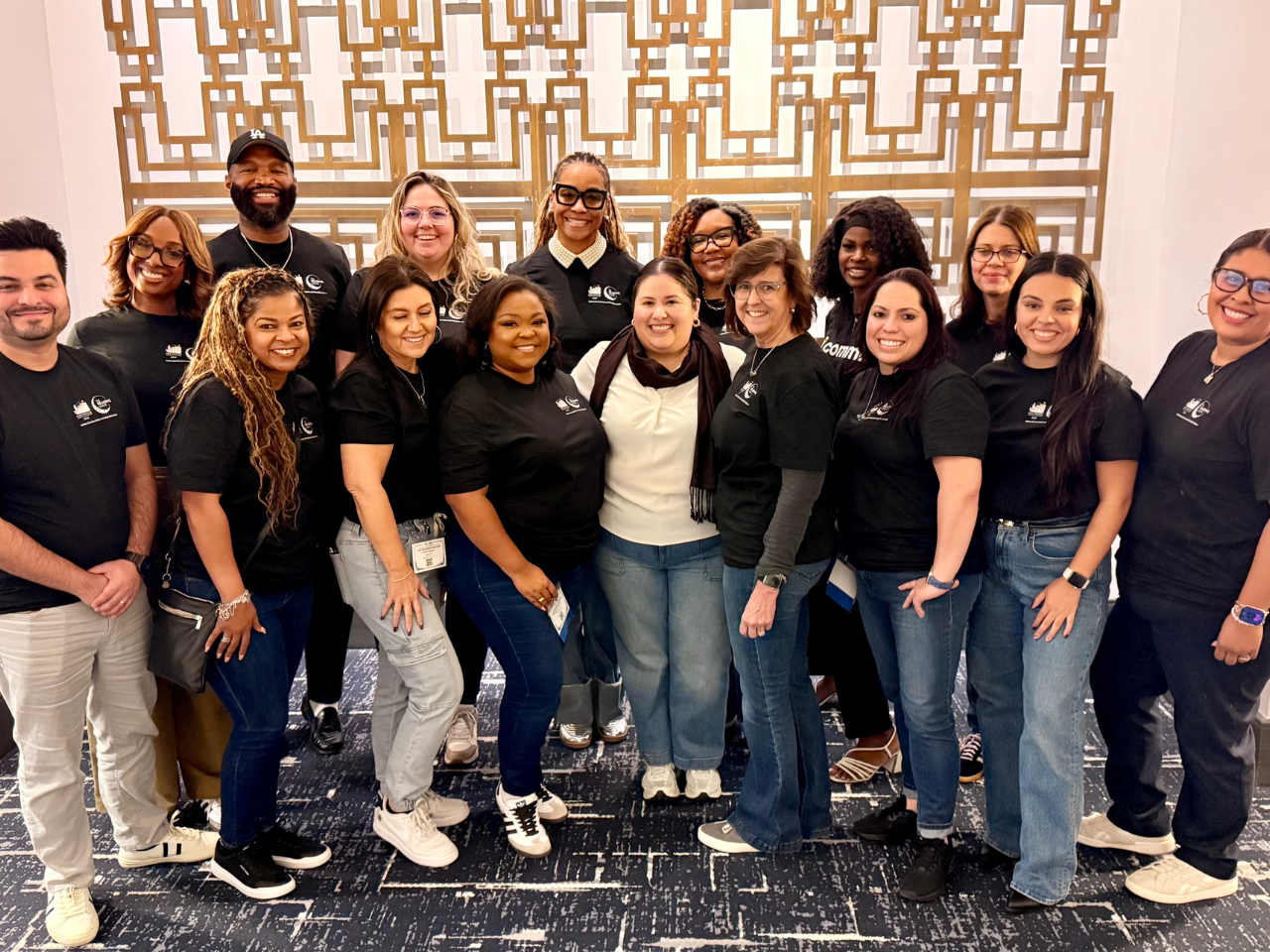Courageous Leadership Sees Results at Thomas C. Marsh
.jpg)
.jpg)


It’s the end of the 2018-19 school year, and Dallas ISD Algebra teacher Teresa Canno-Payne is meeting with one of her students at Thomas C. Marsh Preparatory Academy about the results of her end-of-year exam.
“How do you think you did?”
“Horrible.”
Like many in Ms. Canno-Payne’s class that year, this student wasn’t “supposed” to be there.
“Like, how horrible?”
“Like, a 54?”

Without having been “tracked” into Pre-AP courses in 6th grade, this student, and many like her, entered 8th grade Algebra at a disadvantage. But the instructional leadership at Marsh believed in these students - so much so that they took a major professional risk. One, it turns out, that paid off big time.
“Well, no, you got an 80, which is really, really good.”
“Really good” might even be an understatement. An 80 on the state’s STAAR exam means this student has not only “approached” or “met” the grade level content, but “mastered” it.
“I don’t want to cry,” she replied, through tears.
“I’m very proud of you.”
So how does a student go from barely qualifying for a class to mastering it? And if we know it’s possible, what’s keeping us from doing this for every student?

“Every time I walk into my building, I see myself in our kids.”
Martha Bujanda is the principal of Marsh, a one-time corporate executive who recognized a need for strong educational leadership and has been serving in the Dallas Independent School District for the last 14 years. “It really does stem from my lived experience. I'm an immigrant. I’m fully bilingual. I feel like I can connect pretty easily with our kids and with our community.”
Principal Bujanda sees her private-sector experience as invaluable to her success as a principal (“I know how to use data”), but it is her personal story that informs her educational philosophy.
“For me, for my family, a college degree is what pulled us out of poverty and into the middle class. So I wish that for every single one of our students. But the reality is that we fail our students as a system by not providing the curriculum necessary for that to become a reality. So I want our [education] system to meet the aspirational capital of our kids. And they have great aspirations. It's our responsibility to meet them and raise the expectations in the building and within our adults to ensure that we're providing that for them.”
It may sound like a lofty, poetic vision, but Principal Bujanda has very specific policies and metrics for how to achieve it. The biggest one centers around Algebra, and how some students are prepared for it, while others get left behind.
“It's a little bit arbitrary how [teachers] decide who gets into a Pre-AP track in sixth grade. I don't know that there's a real system. I don't know how much we're looking at the data.”
As demonstrated in the slide below (courtesy of Principal Bujanda), the math class in which a student is placed in 6th grade can shape the outcome of his or her high school career and beyond. Without the ability to take AP classes, students have to pay for additional college credits, and may even require costly remediation courses that don’t count towards a degree.

“By not giving them Algebra in eighth grade, they are not going to get to calculus. They're not going to be put on a college pathway. And so we're basically setting the pathway for the kids - whether they're going to go to college or not - at sixth grade. And that, to me, seems like a complete injustice. So we really wanted to take that on.”
Marsh now places every incoming sixth grader into the Pre-AP track. But Principal Bujanda didn’t want to see her rising 8th graders left behind. So she assigned nearly 100 students to the 8th grade Algebra class, a 50% increase from the previous year. It was a huge risk for the campus, which had just been able to overcome a failing grade in the state’s accountability system and could face serious consequences for backsliding.
“We took a calculated risk pushing kids into Algebra. It took tremendous courage from everybody. The way the system usually works is you choose your highest performing kids, whether that’s 50 or 40 or 30 kids, and have a 100% passing rate all the way across the entire district in Algebra. And then the rest of the kids don't get the college level classes that they need and the rigor that they need to actually be able to pursue and be ready for college.”
For every student that effectively skipped a grade level in order to re-enter the college ready mathematics track, Bujanda was increasing the risk to her campuses’ rating, her own salary and even the salaries of her math teachers. (Teacher and principal pay in the Dallas school district is determined, in part, by student achievement). In order to pull this off, she needed to recruit, develop, and retain a math department full of “vision- and values-aligned” educators.
That’s where Alix Emerson came in.

Like Principal Bujanda, Emerson had a unique journey to the classroom.
“I was a practicing attorney for five years. I spent [time] at the Dallas County DA's office as a prosecutor. And while I was there, I saw cycles of poverty and cycles of crime that affected families and thought to myself, man, there's gotta be a better way. A lot of these kids are in Dallas County schools, do they know where problems can end up? So I took a leap of faith and said ‘I want to try being a teacher and reaching kids before they're getting hit with crimes.’ I took that leap and just finished my fourth year of education.”
Emerson started out teaching math at a different middle school, but was drawn to the leadership Principal Bujanda exhibited at Marsh.
“[Principal Bujanda] casts a vision that all students can succeed no matter what. That is really impactful as a teacher. When I'm in the classroom and having doubts, just knowing her vision, it propels you as a teacher and a leader underneath her. She holds really high standards for teachers and for students. And I think that's great to work under. It's hard work and these kids deserve everything that we can give them.”
Emerson finished her third year of teaching at Marsh and moved up to become the math instructional coach last year. It’s a role that’s little-known outside of the school setting, but one that can make a huge impact on school culture, teacher morale and, ultimately, student achievement. Emerson characterizes her work with three primary responsibilities:
“We do observations and give feedback for the sole purpose of growing teachers. Another aspect is making sure kids are getting the right level of work. I would look at what teachers are putting in front of students and see if it matched the rigor of that grade level. (‘That’s from fourth grade, you can’t do that!’) And then holistically looking at the math department, figuring out, hey, are we serving our kids best? Are we pushing as many kids in the highest level math that they can be?”
It’s that last piece that proved especially crucial this past year. With more students than ever taking on a college-ready workload, it was incumbent upon Emerson to keep the spirit as high as the expectations.
“The way I tried to lead that math department was in a way of positivity and joy. There's a risk of convincing the teachers who you're asking to do this thing that they will say no or they'll act no, and just won't do it. I was always super thoughtful of, okay, how can I present this in a way where the vision is out there, why we're doing this, so that I can bring these teachers along instead of just tell them what we're about to do.”
That attitude was much appreciated by Ms. Canno-Payne, the Algebra teacher on whom much of the responsibility for de-tracking these students ultimately rested. “I was very skeptical,” Ms. Canno-Payne said. “At first we were a little concerned, but you know, the students - they only know what you expect of them. If you expect them to succeed and you expect them to do well, then they do well.” Which is not to say everything came easily.
“I'll say, the first assessment, for both seventh grade Pre-AP and Algebra kids, it didn't look good,” Emerson continued. In fact, in that first cumulative assessment, only 17% of the students were meeting standards. That could have been it for Marsh’s de-tracking experiment. “Thankfully, with Martha's leadership, and Martha's executive director above her, we were allowed to keep going, and no one pulled the plug after those first six weeks.”
An executive director of an urban school district is responsible for the educational outcomes of an entire regional feeder pattern. The principal of each school reports to him or her. Risks like the one taken by Principal Bujanda live and die in the executive director’s office. Thankfully, in Executive Director Melody Paschall, the team at Marsh found an administrative leader who shared their vision of excellence.
“[Executive Director Paschall’s] support was just an imperative component of all this,” Principal Bujanda told me. “If we're not supported by our supervisors, it's very hard to do and take these kinds of risks. [Principals] need to be supported when they take smart, calculated risks that are good for kids and good for college readiness.”
And, sure enough, that risk, in time, led to enormous gains. By the end of the school year, the percentage of students meeting the state’s standards on their final assessment had jumped from just 17% to a whopping 92%, an over five-fold increase.

“I cried a lot when I got those results,” said Emerson, who was promoted to assistant principal as a result of her work. “There was a lot of shock, like, are you serious? This happened? But I think it was one of those reassuring things where the scores spoke to us, the teacher spoke to us, the kids spoke: Hey, this works and you need to keep taking risks for kids.”
So how did they do it? Perhaps unsurprisingly, each educator is quick to praise the other.
“Well, first of all, [Assistant Principal Emerson] is brilliant. That has a lot to do with it,” Ms. Canno-Payne said. “She supported us in a lot of different ways. She's done a good job getting us all to evaluate how we're teaching. You know, we all have the content knowledge, but how do you get it across?”
Assistant Principal Emerson, in turn, gave a great deal of credit of Principal Bujanda, particularly her community outreach efforts. “Principal Bujanda really [took] time to educate parents about why it was so important for their kids to be in Algebra. I remember sitting in a conference and the parents asked, ‘wait, what is Algebra?’ That was huge. Because the parents were there solely so she could explain to them why it was important that their kids were doing this. That was a leader move that I want to replicate going forward, really reaching out to parents and bringing them along so that they can get behind our kids.”
Another major component of Marsh’s success was social-emotional support provided for every student, thanks to a partnership with the Momentous Institute. “We've been working with them for three years,” said Principal Bujanda. “Basically, on a weekly basis, they're there talking through social-emotional means so kids have an outlet and a way to express themselves, how to cooperate, how to deal with anger. They do it through experiential learning, meaning they're doing it through games. And they're also doing work within the classrooms and working with teachers directly to try and build [social-emotional learning] within the classroom curriculum and environment.”
And of course, the largest in-school factor to a child’s success is the teacher in front of them, and Emerson and Bujanda were unceasing in their praise of Canno-Payne and her colleagues. “I want you to really give kudos and shout out our teachers,” Bujanda concluded, “because this work cannot be done without teachers like Ms. Teresa Canno-Payne.”
The students of Marsh are incredibly lucky to have such a dedicated, passionate team of educators working on their behalf. But ultimately, more than the work of any one person, the success of #Algebra4All at Thomas C. Marsh Preparatory Academy is attributable to the power of setting high expectations: for teachers, school leaders, and students alike. But don’t take my word for it. Here’s what another Marsh grad had to say:
“I saw everyone posting their schedule, so I checked and I saw Algebra, and I was like, what’s going on here? I didn’t have Pre-AP 7th grade math, so I was freaking out. So the first thing I did was text my coach, my seventh grade teacher, and I was like, ‘Hey coach, why am I in Algebra if I wasn’t in Pre-AP?’ He said, ‘Your scores were really good, and I know you can do it. I know what you’re capable of.’ I said, ‘Well, alright Coach. Thank you. I’ll try my best.’”
That student also went on to master Algebra. He’ll be taking more Pre-AP classes this Fall.
For more information on participation in Algebra 1 by 8th graders across the county and state, explore the following dashboard:
NOTE: Data provided is from the 2017-18 school year, before the policy change at Marsh occurred








.avif)